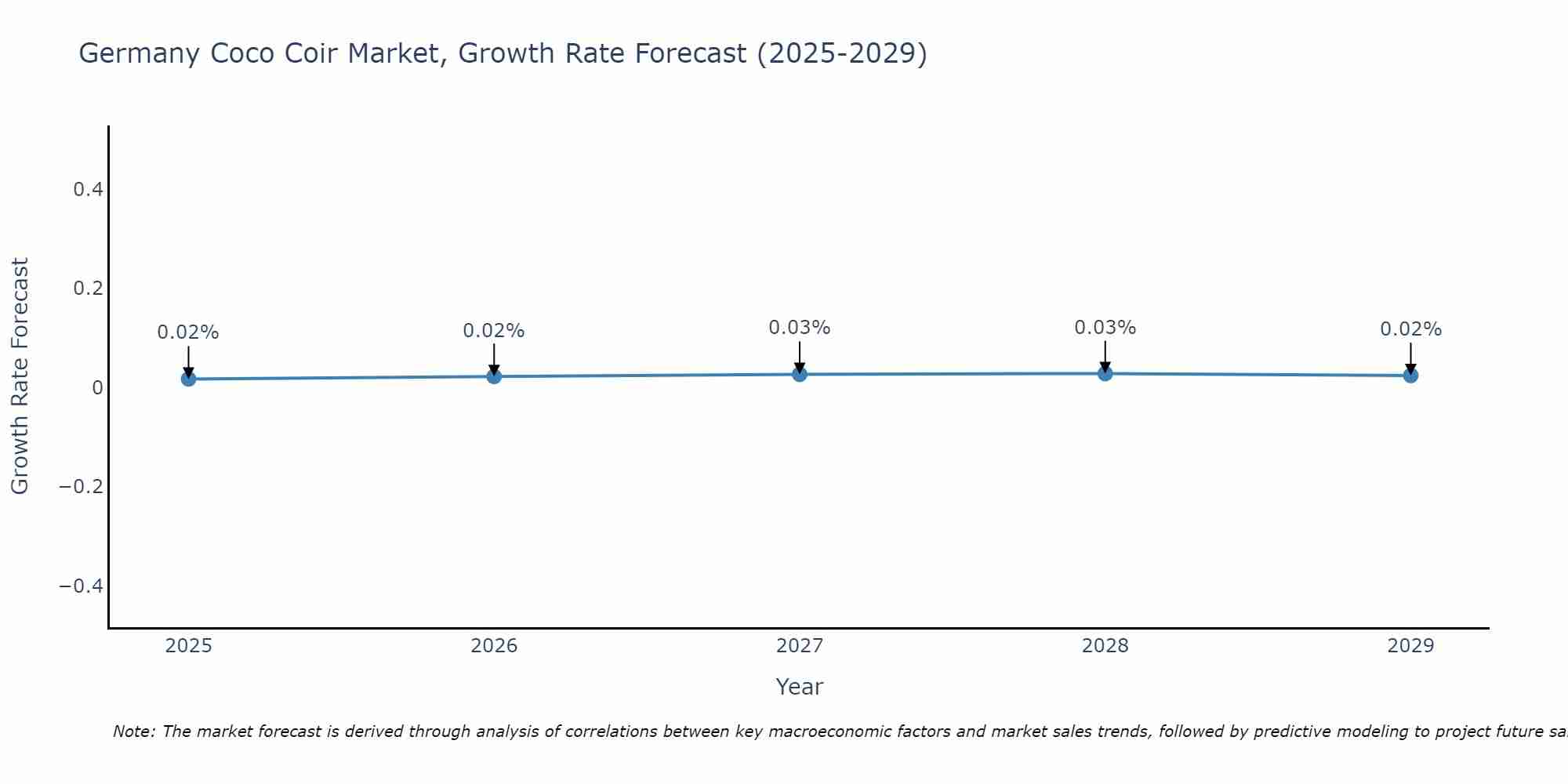Germany Coco Coir Market Outlook | Growth, Revenue, Value, Trends, Share, COVID-19 IMPACT, Companies, Industry, Forecast, Size & Analysis
| Product Code: ETC373691 | Publication Date: Aug 2022 | Updated Date: Jul 2025 | Product Type: Market Research Report | |
| Publisher: 6Wresearch | Author: Ravi Bhandari | No. of Pages: 75 | No. of Figures: 35 | No. of Tables: 20 |
Germany Coco Coir Market Size Growth Rate
The Germany Coco Coir Market is projected to witness mixed growth rate patterns during 2025 to 2029. Starting at 0.02% in 2025, the market peaks at 0.03% in 2028, and settles at 0.02% by 2029.

Germany Coco Coir Market Synopsis
The Germany Coco Coir market is experiencing steady growth driven by increasing demand for organic and sustainable gardening solutions. Coco coir, derived from coconut husks, is valued for its water retention properties, aeration, and ability to improve soil structure. It is widely used in hydroponic systems, potting mixes, and as a soil amendment in horticulture and agriculture. The market is witnessing a shift towards environmentally friendly products, leading to a rise in the adoption of coco coir as a peat moss alternative. Key players in the Germany Coco Coir market are focusing on product innovation, quality assurance, and expanding distribution networks to cater to the growing demand from commercial growers, home gardeners, and landscaping professionals. Overall, the Germany Coco Coir market is poised for further expansion as consumers increasingly prioritize sustainable and eco-friendly solutions for gardening and agriculture.
Germany Coco Coir Market Trends
The Germany Coco Coir Market is experiencing significant growth trends driven by increasing awareness about sustainable agricultural practices and the rising demand for organic products. Coco coir, being a natural and biodegradable alternative to traditional peat moss, is gaining popularity among German farmers and gardeners for its water retention and aeration properties. The market is also witnessing a shift towards the use of coco coir in urban gardening and landscaping applications due to its lightweight nature and eco-friendly characteristics. Moreover, the growing interest in hydroponic farming methods is further propelling the demand for coco coir as a preferred growing medium. Overall, the Germany Coco Coir Market is expected to continue its upward trajectory in the coming years fueled by these sustainability-driven trends.
Germany Coco Coir Market Challenges
In the Germany Coco Coir Market, some key challenges include competition from other growing media alternatives, such as peat moss and perlite, which have traditionally been more popular among gardeners and horticulturists. Another challenge is the inconsistency in quality and sourcing of coco coir products, as there can be variations in the fiber content, salt levels, and pH levels between different suppliers. Additionally, concerns about the sustainability of coco coir production, particularly in terms of water usage and the environmental impact of processing the coconut husks, pose challenges for market growth. To overcome these challenges, companies in the Germany Coco Coir Market may need to focus on educating consumers about the benefits of coco coir, improving product quality and consistency, and implementing sustainable sourcing practices.
Germany Coco Coir Market Investment Opportunities
The Germany Coco Coir Market presents promising investment opportunities due to the increasing demand for sustainable and organic growing mediums in the agriculture and horticulture sectors. Coco coir, a byproduct of coconut husks, is valued for its eco-friendly properties, moisture retention capabilities, and ability to improve soil structure. Investing in the Germany Coco Coir Market could involve opportunities in the production, processing, and distribution of coco coir products such as coco peat, coco chips, and coco fibers. Additionally, there is potential for innovation in developing value-added products like coco coir-based mulches or erosion control mats. With the growing emphasis on environmental sustainability and organic farming practices, the Germany Coco Coir Market is poised for growth and offers attractive investment prospects for forward-thinking investors.
Jordan Agar Market Government Policies
In Germany, the Coco Coir Market is influenced by various government policies aimed at promoting sustainable agriculture and environmental conservation. Policies such as the Organic Farming Regulation and the National Sustainable Development Strategy encourage the use of organic and environmentally friendly growing mediums like coco coir. Additionally, the German government`s initiatives to reduce peat consumption in horticulture have also indirectly benefitted the coco coir market, as it is considered a more sustainable alternative to peat moss. Furthermore, the government provides subsidies and incentives for farmers and horticulturists to adopt eco-friendly practices, which includes the use of coco coir as a soil amendment. Overall, government policies in Germany play a significant role in driving the growth of the Coco Coir Market by promoting sustainable and environmentally responsible practices in agriculture.
Germany Coco Coir Market Future Outlook
The Germany Coco Coir market is expected to witness steady growth in the coming years due to the increasing awareness about sustainable and eco-friendly alternatives to traditional gardening and farming practices. The rise in demand for organic and chemical-free products, coupled with the growing trend of urban gardening and indoor plants, is likely to drive the adoption of coco coir as a preferred growing medium. The versatility and numerous benefits of coco coir, such as water retention, aeration, and biodegradability, make it an attractive choice for both commercial and residential applications. Additionally, the emphasis on reducing carbon footprint and promoting environmentally responsible practices will further boost the market for coco coir in Germany, as consumers and businesses seek greener alternatives for their horticultural needs.
Key Highlights of the Report:
- Germany Coco Coir Market Outlook
- Market Size of Germany Coco Coir Market, 2021
- Forecast of Germany Coco Coir Market, 2031
- Historical Data and Forecast of Germany Coco Coir Revenues & Volume for the Period 2018 - 2031
- Germany Coco Coir Market Trend Evolution
- Germany Coco Coir Market Drivers and Challenges
- Germany Coco Coir Price Trends
- Germany Coco Coir Porter's Five Forces
- Germany Coco Coir Industry Life Cycle
- Historical Data and Forecast of Germany Coco Coir Market Revenues & Volume By Product for the Period 2018 - 2031
- Historical Data and Forecast of Germany Coco Coir Market Revenues & Volume By Coco Coir Grow Bags for the Period 2018 - 2031
- Historical Data and Forecast of Germany Coco Coir Market Revenues & Volume By Bales for the Period 2018 - 2031
- Historical Data and Forecast of Germany Coco Coir Market Revenues & Volume By Coir Material for the Period 2018 - 2031
- Historical Data and Forecast of Germany Coco Coir Market Revenues & Volume By Open Tops for the Period 2018 - 2031
- Historical Data and Forecast of Germany Coco Coir Market Revenues & Volume By Blends & Loose Substrate for the Period 2018 - 2031
- Historical Data and Forecast of Germany Coco Coir Market Revenues & Volume By Others for the Period 2018 - 2031
- Historical Data and Forecast of Germany Coco Coir Market Revenues & Volume By Application for the Period 2018 - 2031
- Historical Data and Forecast of Germany Coco Coir Market Revenues & Volume By Rope & Cordage for the Period 2018 - 2031
- Historical Data and Forecast of Germany Coco Coir Market Revenues & Volume By Coco Nets & Twines for the Period 2018 - 2031
- Historical Data and Forecast of Germany Coco Coir Market Revenues & Volume By Stitched Mats for the Period 2018 - 2031
- Historical Data and Forecast of Germany Coco Coir Market Revenues & Volume By Coconut Meals for the Period 2018 - 2031
- Historical Data and Forecast of Germany Coco Coir Market Revenues & Volume By Husk for the Period 2018 - 2031
- Historical Data and Forecast of Germany Coco Coir Market Revenues & Volume By Others for the Period 2018 - 2031
- Historical Data and Forecast of Germany Coco Coir Market Revenues & Volume By Consumer for the Period 2018 - 2031
- Historical Data and Forecast of Germany Coco Coir Market Revenues & Volume By Green Houses for the Period 2018 - 2031
- Historical Data and Forecast of Germany Coco Coir Market Revenues & Volume By Sellers for the Period 2018 - 2031
- Germany Coco Coir Import Export Trade Statistics
- Market Opportunity Assessment By Product
- Market Opportunity Assessment By Application
- Market Opportunity Assessment By Consumer
- Germany Coco Coir Top Companies Market Share
- Germany Coco Coir Competitive Benchmarking By Technical and Operational Parameters
- Germany Coco Coir Company Profiles
- Germany Coco Coir Key Strategic Recommendations
Frequently Asked Questions About the Market Study (FAQs):
- Single User License$ 1,995
- Department License$ 2,400
- Site License$ 3,120
- Global License$ 3,795
Search
Related Reports
- Portugal Electronic Document Management Market (2025-2031) | Strategy, Consumer Insights, Analysis, Investment Trends, Opportunities, Growth, Size, Share, Industry, Revenue, Segments, Value, Segmentation, Supply, Forecast, Restraints, Outlook, Competition, Drivers, Trends, Demand, Pricing Analysis, Competitive, Strategic Insights, Companies, Challenges
- France Electronic Document Management Market (2025-2031) | Strategy, Consumer Insights, Analysis, Investment Trends, Opportunities, Growth, Size, Share, Industry, Revenue, Segments, Value, Segmentation, Supply, Forecast, Restraints, Outlook, Competition, Drivers, Trends, Demand, Pricing Analysis, Competitive, Strategic Insights, Companies, Challenges
- Portugal Occupational Health & Safety Services Market (2025-2031) | Strategy, Consumer Insights, Analysis, Investment Trends, Opportunities, Growth, Size, Share, Industry, Revenue, Segments, Value, Segmentation, Supply, Forecast, Restraints, Outlook, Competition, Drivers, Trends, Demand, Pricing Analysis, Competitive, Strategic Insights, Companies, Challenges
- Netherlands Occupational Health and Safety Services Market (2025-2031) | Strategy, Consumer Insights, Analysis, Investment Trends, Opportunities, Growth, Size, Share, Industry, Revenue, Segments, Value, Segmentation, Supply, Forecast, Restraints, Outlook, Competition, Drivers, Trends, Demand, Pricing Analysis, Competitive, Strategic Insights, Companies, Challenges
- Belgium and Luxembourg Facility Management Market (2025-2031) | Strategy, Consumer Insights, Analysis, Investment Trends, Opportunities, Growth, Size, Share, Industry, Revenue, Segments, Value, Segmentation, Supply, Forecast, Restraints, Outlook, Competition, Drivers, Trends, Demand, Pricing Analysis, Competitive, Strategic Insights, Companies, Challenges
- Russia Women Intimate Apparel Market (2025-2031) | Strategy, Consumer Insights, Analysis, Investment Trends, Opportunities, Growth, Size, Share, Industry, Revenue, Segments, Value, Segmentation, Supply, Forecast, Restraints, Outlook, Competition, Drivers, Trends, Demand, Pricing Analysis, Competitive, Strategic Insights, Companies, Challenges
- Africa Chocolate Market (2025-2031) | Size, Share, Trends, Growth, Revenue, Analysis, Forecast, industry & Outlook
- Global Hydroxychloroquine And Chloroquine Market (2025-2031) | Industry, Trends, Size, Outlook, Growth, Value, Companies, Revenue, Analysis, Share, Forecast
- Saudi Arabia Plant Maintenance Market (2025-2031) | Industry, Size, Growth, Revenue, Value, Companies, Forecast, Analysis, Share & Trends
- Taiwan Electric Truck Market (2025-2031) | Outlook, Industry, Revenue, Size, Forecast, Growth, Analysis, Share, Companies, Value & Trends
Industry Events and Analyst Meet
Our Clients
Whitepaper
- Middle East & Africa Commercial Security Market Click here to view more.
- Middle East & Africa Fire Safety Systems & Equipment Market Click here to view more.
- GCC Drone Market Click here to view more.
- Middle East Lighting Fixture Market Click here to view more.
- GCC Physical & Perimeter Security Market Click here to view more.
6WResearch In News
- Doha a strategic location for EV manufacturing hub: IPA Qatar
- Demand for luxury TVs surging in the GCC, says Samsung
- Empowering Growth: The Thriving Journey of Bangladesh’s Cable Industry
- Demand for luxury TVs surging in the GCC, says Samsung
- Video call with a traditional healer? Once unthinkable, it’s now common in South Africa
- Intelligent Buildings To Smooth GCC’s Path To Net Zero













